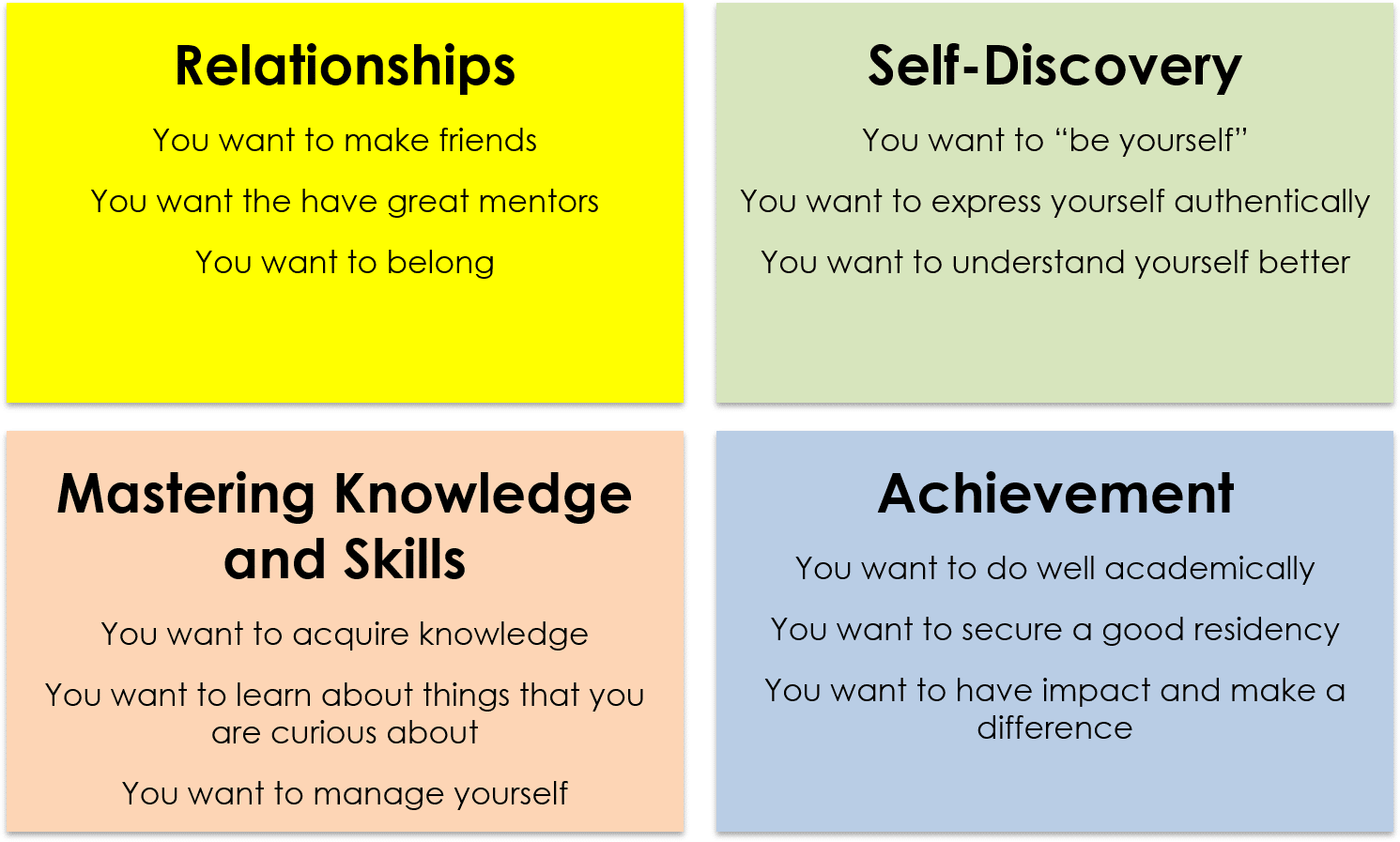Back in the 80’s, when I was a kid, we talked about what we wanted to be when we grew up. We talked about being a doctor, and what that would entail. Back then the image was of a person taking care of patients in his or her own practice, and on Friday’s there’d be golf. I don’t really know whether that image was actually true at the time, but those days, if they ever existed, are long gone.
These days, in medical education, we’re trying to prepare a new generation of doctors to be successful in their practice of medicine. The challenges are quite steep given the culture that exists within medicine that has one of the highest instances of burnout and suicide of any profession. Med students are understandably wary of entering this fray. Like many people I know, there’s a weariness about talking about burnout; it’s like we’re drowning and all that we seem capable of doing is describing the water.
What can we do? Sometimes it’s easier to know what to do if we look at a situation that is different but parallel from our own.
The story of farming
One such parallel example is the story of farming. It mainly involved pulling a plow and planting seeds. Then in the fall, it involved harvesting the crops. From the earliest times of civilization, to about a 70 years ago, farming had been pretty stable. Within the last 70 years, a new form of farming appeared on the scene. People found that if farming was just about pulling a plow, then a machine can do it better, and indeed a machine can pull a plow much better than a human can. We learned how to leverage machines and technology to do things bigger, faster, and more profitably. This began the age of corporate farming.

With corporate farming, crop yields skyrocketed. We used genetic engineering to create all kinds of GMO seeds. The groceries stores are overstocked with food from the corporate farming enterprise. BUT…something was missing. The food was missing ‘something’ important. It wasn’t quite like what it was before. The farmers who were a cog in the corporate farming machine, planting their single crop for maximum yield felt something missing; the act of farming lacked a certain sense of significance and meaning.
So, recently, a small but ever-growing number of farmers began to leave corporate farming behind. That doesn’t mean that they left all the machines behind; the machines supported the farmer’s art of farming instead of dictating the terms of farming. For these farmers, farming became once again, a human profession of working with the earth to create nourishment. This type of farming (I’ll call it “organic” although it’s about the spirit rather than the rules) did not quite have the same amount of crop yield, but the practice of this farming produced more wholesome foods and gave farmers a renewed sense of meaning and purpose in farming.
The parallel in medicine
Like in farming, there was a traditional form of medicine. The medicines themselves may have been different, but it involved a healer providing care and a healing presence to someone afflicted with a malady. it was a relationship between these two people that defined the profession. Then as technology and money entered the scene, there was the thinking about how medicine could be done bigger, faster, and more profitably. Incrementally, medicine grew in it’s ‘corporateness’. People didn’t think, “How can we make medicine into a corporate enterprise?” It just incrementally happened.
If you go to any university with a health system, you will find that the newest buildings are those of the health system. You will find that the employees of the health system are roughly the majority of all the employees of the university. You will find that the health system will represent over 70% of the revenues for that university. We are in the era of corporate medicine.

In the era of corporate medicine, we are quite enamored with the capabilities of technology to solve problems. The drive is to become bigger, faster, and more profitable. Like in corporate farming, the “yield” in corporate medicine is high. The practitioners (and patients) however, know that something is “missing” (because the foundation of the doctor-patient relationship has been made subservient to corporate goals). The burnout and suicide are just symptoms of this corporatization of medicine. Even though there has been efforts to reduce healthcare costs and remedy health inequities, those efforts are destined to fail because a fundamental aim of the corporate mentality is to increase profits, resulting in higher costs and inequity, which is what we are observing.
There has been a lot of attention paid to wellness recently. However, wellness programs will not solve the issue. Wellness can’t be about being a respite from being a cog in the health care corporate machine. Wellness, in the end, has to be about a state of being, where the practice of medicine itself is healing in its spirit.
So what is to be done? I do believe that medicine will begin to transcend the era of corporate medicine. That doesn’t mean that we’ll leave all the machines behind, but it does mean that the machines won’t be the most important thing. The most important thing again will be to re-establish that sacred healing relationship between the healer and the afflicted. You can’t “scale” that because each healer, has within him or her a unique contribution to the profession of healing.
As doctors become disillusioned, the work to transcend the era of corporate medicine begins from within the individual. When you find your own meaning in the practice of medicine, you will “show up” for patients differently. The hardest part is that there is no formula for finding your joy and meaning. You have to look inside at your life and see what that is guiding you towards as a healer. What you will notice is that some things are more exciting and alive than other things. Follow those clues.
If you wait for the system to change, it will not. It is not up to the system to change. The system changes as individuals find the courage to live according to their values. That is what leadership is really about.
Back to medical education
In order to facilitate the advancement of the profession, medical education has to foster the development of professional identity. If what’s needed is a greater development of one’s sense of meaning and purpose, medical education needs to deliberately cultivate this as earnestly as it cultivates the ‘hard skills’ in medicine. Without this, students will graduate and potentially become a cog in the machine.
For students, thinking about your meaning and purpose is of highest importance while you are in medical school. Medical education in its current state is horrible in developing the meaning and purpose aspect of professional identity. That’s the reason for this website/blog. How do you develop your meaning and purpose? There are twelve questions that you should think about. It’s not glamorous or sexy, but neither is studying for the boards. If you don’t study for the boards, you won’t do well. If you don’t deliberately consider meaning and purpose, you won’t have it, and that will have consequences for you as you enter your professional practice.
Related Posts:
What Do You REALLY Want From Med School?
- Relationships: Finding Your Tribe
- Mastering Knowledge and Skills: The 10-Year Commute
- Achievement: The Essence of Achievement
- Self-Discovery: Transcending Corporate Medicine

If you successfully target all four quadrant quadrants, you will have an AMAZING medical school experience.

Prompt for Personal Reflection
What are my deepest-held values about what medicine should be?
What are my unique strengths that I can apply to my practice of healing?
